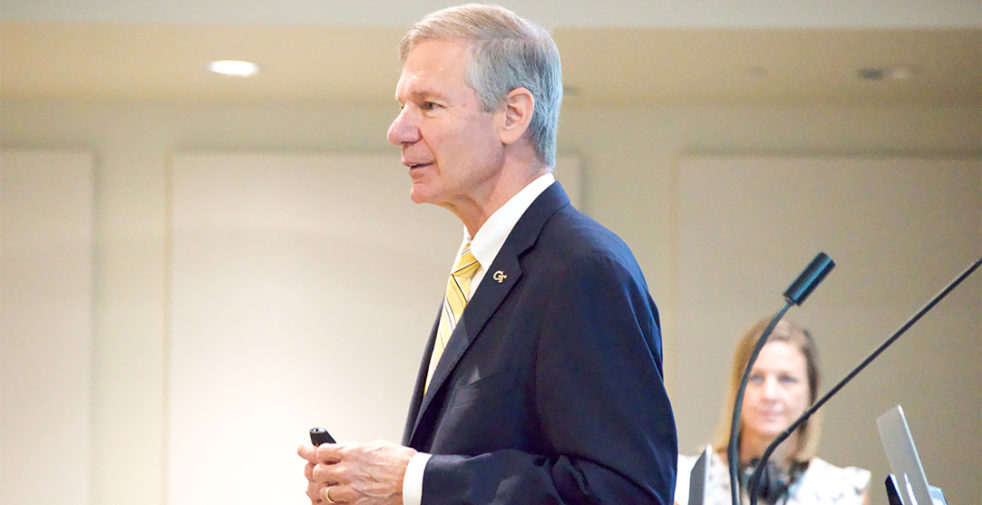After 10 years of serving as president of the Institute, on Monday President G.P. “Bud” Peterson announced his decision to step down to a faculty position in the summer.
While Peterson said that he had been in conversations with his wife Valerie on when he would retire for several years, figuring that “Ten’s a nice number,” he only began to discuss his possible retirement with his boss, University System of Georgia (USG) Chancellor Steve Wrigley, after last summer’s revelations of multiple ethics violations across the Institute.
“We’ve had some issues in the past year or so,” Peterson said. “I hadn’t really broached the topic about retiring [to Chancellor Wrigley] before that all started.”
Over the course of his time at Tech, Peterson worked to expand Tech’s services through several developments across campus, including the construction of Coda and 30 corporate innovations in Tech Square, along with the Clough Undergraduate Learning Commons and the Marcus Nanotechnology Building on main campus, among many others.
“Under Bud’s leadership, Georgia Tech became the first institution in a decade to receive an invitation to join the prestigious Association of American Universities,” said Wrigley in a USG press release. “His focus on research led to an increase in total awards from $445 million to $851 million. At the same time, he grew student enrollment, including the number of women enrolled in first-year classes and transformed the landscape of midtown Atlanta.”
“I’d like for people when they think about the time I spent here that Georgia Tech’s a better place because he was here,” Peterson said. “And if that’s the case, then I’m good.”
In the last couple of years, Tech administration has been under scrutiny due to a variety of crises, beginning with the death of Scout Schultz at the hands of a Georgia Tech Police Department (GTPD) officer on Sept. 2017, continuing ethic scandals revealed in summer 2018, and concluding most recently with two suicides in December 2018.
Peterson said that his goal during the past few months has been to “right the ship, turn the corner” before stepping down to a faculty role where he hopes to both teach and do research.
Peterson believes he has made an ample short-term response to these issues and has set the foundation for long-term cultural shifts.
For example, three actions teams were created following Scout Schultz’s death. A planned fourth action team on Campus Safety that would likely have examined GTPD’s relationship with the campus never materialized, and a vast restructure of administrative positions took place after last summer’s ethics issues. In response to December’s suicides, Peterson expedited searches for Counseling Center staff.
“But there is a shortage of mental health professionals across the country, and so we’ve got some challenges trying to find the people to fill those positions,” Peterson said.
It is true that there is a national shortage of mental health professionals — on Jan. 9, 2018, the U.S. Health Resources and Services Administration (HRSA) released data that over 115 million Americans live in mental health professional shortage areas — but the amount of mental health professionals varies geographically. Tech, for example, in a shortage area, according to the HRSA.
“This is a national issue,” Peterson said. “Georgia Tech is not unique. When presidents get together today, the number one topic that we talk about is mental health and well-being.”
Peterson says the job does not stop at hiring more staff for the counseling center and developing the Intake Center, a triage facility opening this year that focuses on fast responses for students seeking counseling.
“What we have to do is figure out is how to develop a more supportive community,” Peterson said. He encourages all students to take Question, Persuade and Refer (QPR) training in order for students to better recognize signs of mental distress in their peers and know how to react.
On all of these fronts, whether it comes to improving ethics or mental health culture, it remains to be seen if recent initiatives will produce long-lasting change.
“We’ve made the changes, we’ve incorporated them, we’ve put them in place,” Peterson said. “Now we just need to make sure they’re regularized and become part of the DNA of how we operate.”
One of the transitions Peterson is most proud of is the expansion of online learning such as the Online M.S. in Computer Science.
“If you’d have told me ten years ago, when I came to Georgia Tech, that we would offer degrees to students who never step foot on campus, I would have said: no way,” Peterson said.
When he steps down into his faculty role at the end of summer, Peterson can resume the original passion that drove him in 1975 leave his job as an engineer and pursue a Ph.D.: researching and teaching mechanical engineers all about heat. So what classes would be his pick to teach?
“Thermodynamics, interfacial transport phenomena, fluid mechanics, heat transfer,” Peterson said. “Those types of things.”
